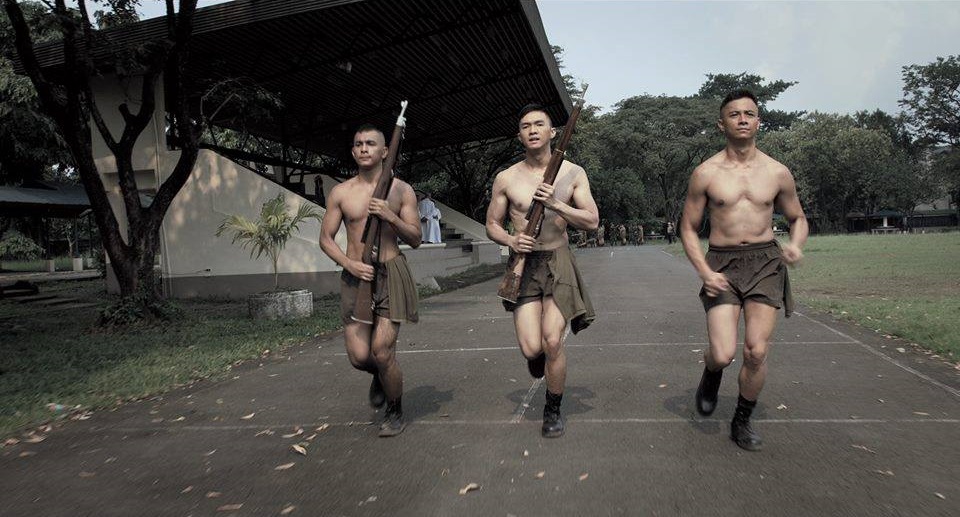“The speed of ideas is not directly proportional to the speed of funding.”
That’s a statement by award-winning filmmaker Auraeus Solito who, in 2013, decided to adopt his tribal-spirit name from Palawan — Kanakan-Balintagos — as his professional name. (The name is hyphenated and it means “Hunter of Truth).”
Thus, his last feature film, Esprit d’Corps, released in 2014, had “Kanakan-Balintagos” for directorial credit. Since then, KB has practically stopped making films, most likely because “the speed of ideas is not…”
All the years he hasn’t been making films, KB has been mostly living in Palawan (though he was born and raised in Sampaloc, Manila), where his mother came from, specifically in the southern part. KB was first brought by his mother to her hometown when he was five years old. Since then, he has been visiting the place and other parts of Palawan as often as he could, especially when he became a filmmaker.
Last year, in Palawan, a boy fan asked KB why he wasn’t doing anything on Palawan epics. The opening quote above was the filmmaker’s reply.
But then he recalled receiving a call from a woman friend who asked him to stage the Palawan epic about a Tagbanua Kalamianen warrior-hero by the name of Dumaracol. (Tagbanua is a tribe in Palawan; Kalamianen refers to the Calamianes islands in the northern part of Palawan).
Palawan, the country’s biggest province in terms of land area, has several epics, some of which are unwritten up to now and “recorded” only as chants in the minds of old Palaweños.

Dance-drama
KB learned that a University of the Philippines professor he knew from his Theater Arts days in Diliman, Eli Guieb III, had discovered a chanted epic in Palawan in 1997 and had already commissioned a Palaweño to translate it to Tagalog. When KB sent Guieb a Facebook message, Guieb sent KB all his raw materials about Dumaracol, who was said to have lived at the time foreigners had begun to set foot in Palawan and were attempting to subjugate the islanders.
The epic, sung by different sets of chanters, was recorded between 1997 and 2013 by Guieb of the UP Department of Broadcast Communications. Guieb, a native of Bulacan, lived in the Calamianes islands and in mainland Palawan almost the whole of 1997 while working on his Master of Arts in Literature degree at UP Diliman. He went back there in 2013 to meet again with the Calamianens who chanted the Dumaracol for him. Sadly, some of the old islanders had died by then.
Chanted epics don’t seem to have titles, so KB gave the Tagalog translation and his adaptation of it the title “Paraan ng Paglipad.” On 21 to 22 December, it was staged as a dance-drama at the meditation hall of the Guang Ming College in Tagaytay, with GMC students and some GMC teachers as performers.
GMC-Tagaytay
KB knew before writing the play that he was doing it for GMC-Tagaytay, one of the three performing art schools funded by a Buddhist group (Fo Guang Shan) and operated by Buddhist nuns. The first GMC is in Manila, at the Mabuhay Buddhist Temple at P. Ocampo St. (former Vito Cruz) right across Century Park Sheraton Hotel. The school produced some years ago the musical Siddharta which was first staged at the Cultural Center of the Philippines and was brought to various parts of the US, with a mostly GMC student cast.
The second GMC is in Cebu City. The one in Tagaytay is the third, headed by Michael L. Tan, the UP Diliman Chancellor from 2014 to 2020.
In the Paraan ng Paglipad souvenir program, Tan stressed that at GMC, “humanist principles are taught together with religious freedom.”
Kanakan-Balintagos wrote the play and directed Paraan ng Paglipad. With a cast of about 30 actors in flowing colorful costumes, the dance-drama was an engaging production, watched by an audience of about 200 on opening night.
Among those in the audience were National Artist Kidlat Tahimik, his wife Kathryn de Guia (who wrote about KB in her book Kapwa — The Self in the Other: Worldviews and Lifestyles of of Filipino Culture Bearers), playwright-actor Frank Rivera, playwright-educators Luna Sicat Cleto and Glenn Mas, and theater aficionado Phil Panganiban who is a member of the award-giving body Philippine Live Entertainment Arts and Festival, of which Rivera is the founder-vice president. (This writer is also a LEAF jury member for Theater).
